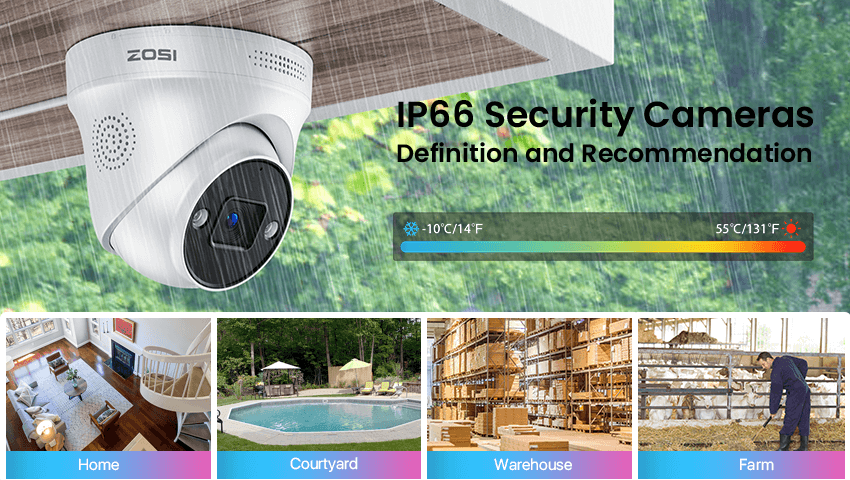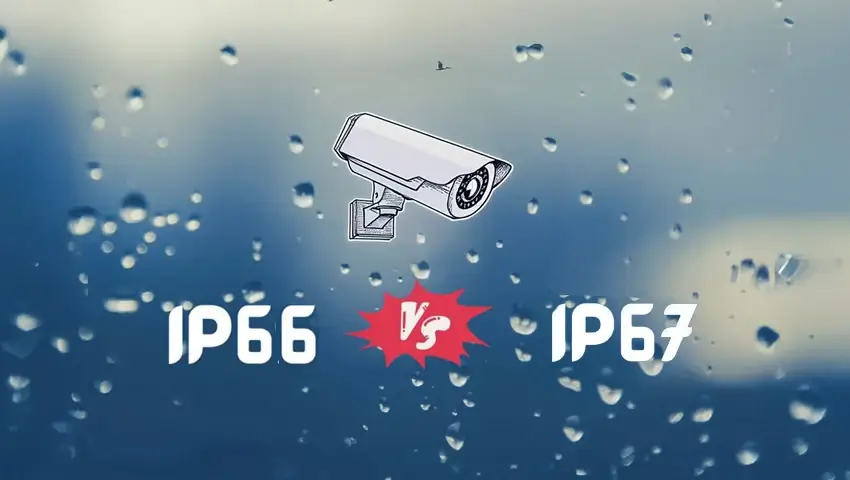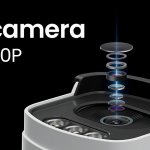Contents
Introduction
In today’s world, security monitoring has become an essential part of households, shops, and businesses. When choosing a security camera, many users focus on resolution, night vision, and smart detection features. However, there is another specification that is often overlooked but extremely important—the IP rating. For outdoor installations in particular, dustproof and waterproof performance directly determines how durable and reliable a camera will be. Among all options, IP66 cameras are one of the most recommended choices. But what exactly does IP66 mean, and why is it suitable for outdoor surveillance? Let’s break it down.
What Is IP66?
The IP rating stands for Ingress Protection. It consists of two digits that indicate how well a device is protected against solids (like dust) and liquids (like water).
·The first digit refers to protection against solids, ranging from 0 to 6. The higher the number, the better the dust protection.
·The second digit refers to protection against liquids, ranging from 0 to 9. The higher the number, the stronger the water resistance.
For IP66 cameras:
·The first “6” means the device is completely dust-tight. No dust particles can enter, ensuring that the internal components remain clean and functional.
·The second “6” means the device is protected against powerful water jets from any direction. Heavy rain or direct water spray won’t interfere with the camera’s operation.
It’s worth noting that IP66 does not mean the camera can be submerged in water for long periods. If your installation area is prone to flooding, a higher protection rating such as IP67 or IP68 may be more appropriate. But for everyday outdoor use, IP66 is more than sufficient.
Advantages of IP66 Cameras
Why are IP66 security cameras so widely recommended for outdoor use? Their protective design brings several key benefits:
1.Superior Dust Resistance
Outdoor environments often expose cameras to dust, sand, or even small insects. With an IP66 rating, the camera is fully sealed and completely dustproof, preventing image quality issues or electrical failures.
2.Reliable Waterproofing
Rain, sprinkler systems, or even high-pressure cleaning can pose threats to outdoor cameras. IP66 cameras withstand strong water jets without water penetration, ensuring the system continues to function during storms or washing.
3.All-Weather Performance
Whether it’s a scorching summer, windy autumn, or snowy winter, IP66 cameras maintain stable performance throughout the seasons. This weather resistance makes them especially dependable for year-round outdoor monitoring.
4.Longer Lifespan
Since the internal components are protected from dust and water, IP66 cameras generally last longer and require less maintenance, which saves replacement and repair costs over time.
Best Use Cases for IP66 Cameras
Thanks to their strong dust and water resistance, IP66 cameras are ideal for a wide range of outdoor environments, such as:
·Residential yards and front doors: Constantly monitor entrances and property surroundings, day and night.
·Garages and parking areas: Protect vehicles from theft or vandalism, even in rainy conditions.
·Shops and storefronts: Help business owners keep track of customer flow and potential security risks.
·Farms, warehouses, and construction sites: Handle dusty, wet, and rugged conditions with ease.
Practical Tips When Choosing an IP66 Camera
Knowing the benefits of IP66 protection is just the first step. Here are additional features to consider when selecting the right camera:
1.Image Resolution – Higher resolution such as 2K or 4K provides clearer details for outdoor monitoring.
2.Night Vision – Ensure the camera supports infrared night vision or full-color night vision to handle low-light conditions.
3.Detection & Alerts – Smart features like motion detection, human detection, or vehicle alerts reduce false alarms and improve security.
4.Installation Options – Depending on your setup, you can choose wired, wireless, or solar-powered models for stable operation.
5.Storage Methods – Decide between local storage (SD card) or cloud storage depending on your data security needs.
Conclusion
The IP66 rating—level 6 dustproof and level 6 waterproof—makes these cameras one of the most reliable choices for outdoor monitoring. With the ability to resist dust and withstand heavy rain, IP66 cameras are designed for year-round, all-weather use.
For households, garages, shops, or farms, choosing an IP66 camera ensures greater durability, lower maintenance costs, and peace of mind in terms of security.
When making your purchase, consider not only the IP rating but also resolution, night vision, detection features, and storage options. By doing so, you’ll get a camera that not only withstands tough environments but also delivers clear, reliable, and smart surveillance for your needs.
Whether for home or business, an IP66 camera can provide the strong and dependable protection you’re looking for.




